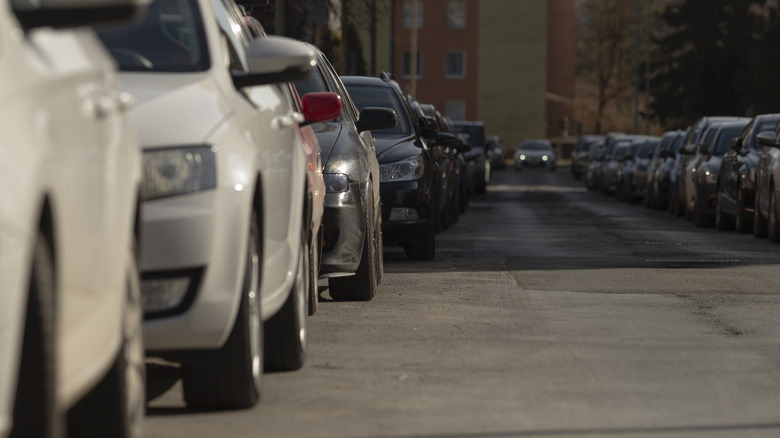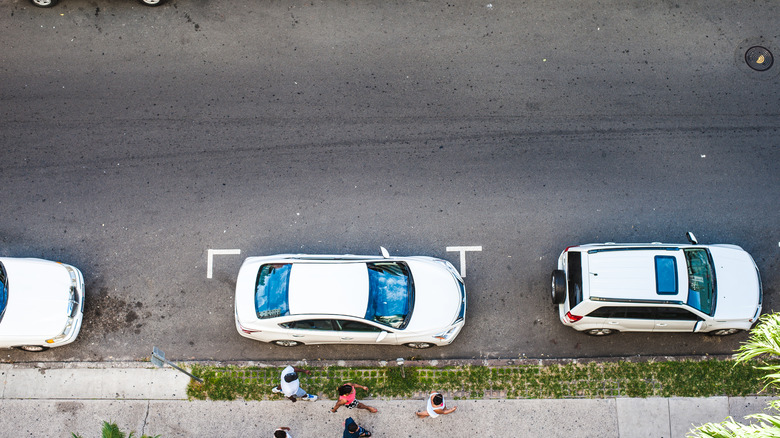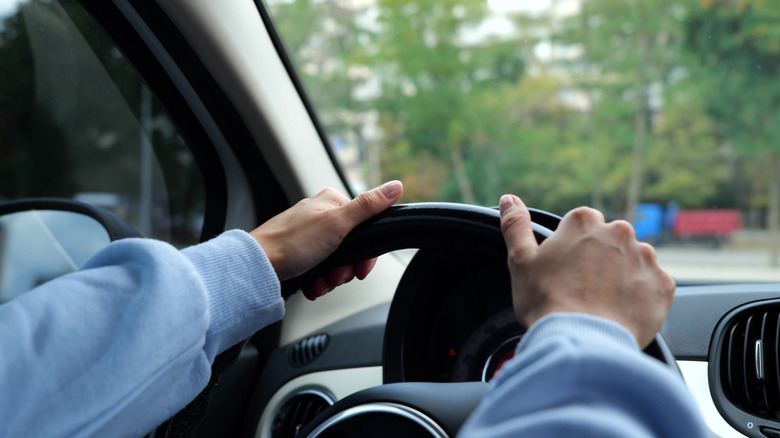Drivers In These Cities Are The Most Afraid Of Parallel Parking
If you've been driving for long enough, and particularly if you've had the same car for a long time, you develop a keen instinct for which parking spots will be too much of a squeeze. Parallel parking is a bit of an exception though; it can be difficult to pull off and you might prefer to simply avoid it. If you're one of those very wary parallel parkers, this one's for you. In September 2025, Compare The Market revealed the results of a study performed the previous year, aimed at determining the cities whose drivers are most prone to being anxious about performing a parallel park. In the United States, Georgia's state capital, Atlanta, received the highest Parallel Parking Anxiety Index of any city in the country, at 81 out of 100.
As part of the study, Compare The Market determined the Parallel Parking Anxiety Index of 48 cities across the United States. In order to compare them, two different factors were used. Firstly, the social media mentions of parallel parking in the city, weighted by their negative, neutral, or positive intent, were considered to arrive at a composite sentiment score. This was then combined with Google searches per 1,000 capita, determining how frequently that city's drivers scoured social media with searches such as "parallel parking tips," "parallel parking help," "parallel parking tutorial," and "parallel parking explained." Normalization of the data led to a score between 0 and 1, then translated to one between 1 and 100. Two more state capitals take the second and third spots on the list: Boston and Honolulu respectively. The world's first self-parking car was introduced longer ago than you may think, but parallel parking remains a problem that even the best drivers can have a tricky time with.
The opposite side of the Parallel Parking Anxiety Index
Compare The Market's data also considers the U.S. cities with the most relaxed attitudes to parallel parking. At the other end of the scale is Tennessee's state capital, Nashville, which has a far, far lower Parallel Parking Anxiety Index of just 5.92 out of 100. This is curious because Nashville does not have a reputation for being a relaxed environment for drivers. On the contrary, INRIX's 2024 Traffic Scorecard Report placed Nashville at number 27 in its list of the most congested cities in the world and eleventh-most congested in the country. Nonetheless, it seems that parallel parking doesn't phase some Nashville drivers. It's a similar case in Albuquerque, it seems, a city with a Parallel Parking Anxiety Index of 14.08.
On a nationwide level, though, U.S. drivers aren't as anxious about the prospect of parking parallel to the road as some of their contempories. With a national Parallel Parking Anxiety Index score of 54.53, the USA is the eighth-most averse country to parallel parking in the world, nestled between Ireland with a slightly higher score of 54.86 in seventh and the U.K. in ninth, with a marginally lower 53.92. The States' northern neighbors, Canada, top the list with 87.35, making Canadian drivers as a whole the world's most fearful of parallel parking according to the study. By a considerable distance, too. The United Arab Emirates, in second place, had a score of 72.73. Evidently, then, the specter of this parking maneuver is one that haunts many drivers. Previously, we've created a guide for perfect parallel parking that's sure to be helpful for nervous drivers, but it's still a skill that takes considerable practice and confidence.
Some reasons why parallel parking is considered so stressful
A minor parking miscalculation can cause anything from a fault in a driving test to a tire-damaging curb bump or a serious injury. A lot of the concern regarding parallel parking, then, is naturally all about the fact that space is typically about as limited as can be when performing it. Compare The Market concluded that U.K. drivers are about as nervous about doing so as their counterparts across the pond, and some U.K. research supports this. In September 2023, FIAT released a study of 2,000 U.K. motorists' feelings on the matter. It found that the average distance those drivers were willing to park out of their way to avoid needing to parallel park was almost a mile (0.8 miles). Lots of drivers are surely familiar with the idea of picking a safer spot over a closer one (a corner space means that you can only potentially be bumped on one side, for instance), and this wariness about parallel parking can simply be an extension of that.
For others, according to FIAT, there's something deeper than that. The managing director of FIAT U.K., Damien Dally, said of the situation, "cars have grown in size in recent years, which can only add to the additional stress of parallel parking caused by things like fear of holding up traffic or bumping into and damaging another car." Fally went as far as to say that it was important to try to "reduce 'parallelophobia' impacting millions of Brits." One benefit of smaller vehicles is that parking can be considerably easier, but the fact remains: parallel parking is an infamous technique that a lot of drivers are loathe to perform unless absolutely necessary. As a result, they may have very limited experience with it.


